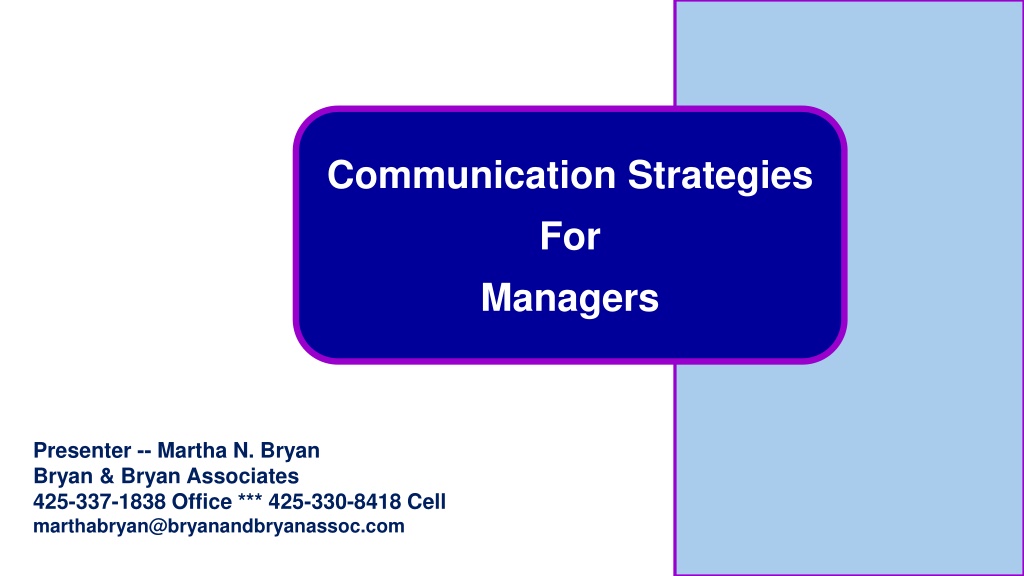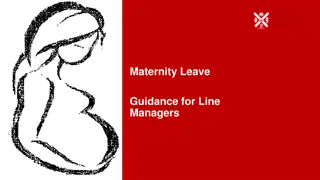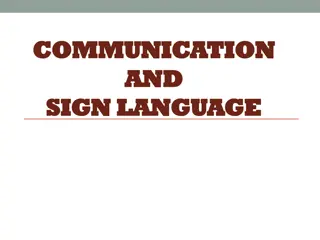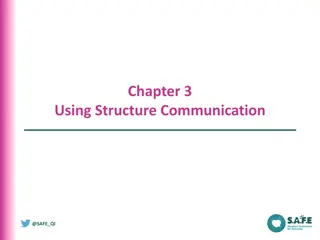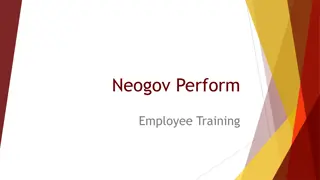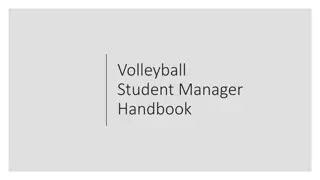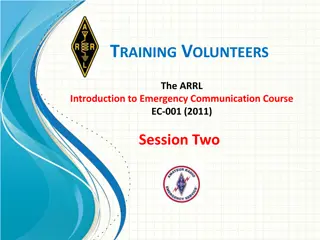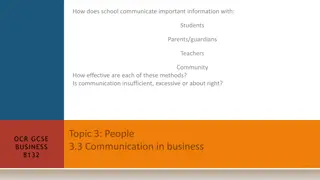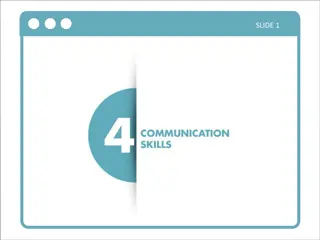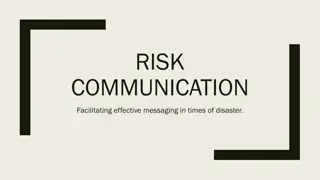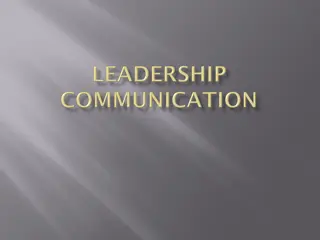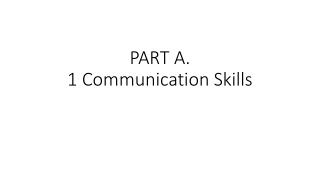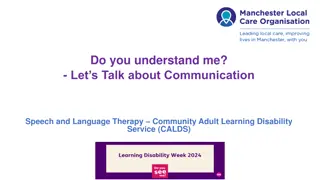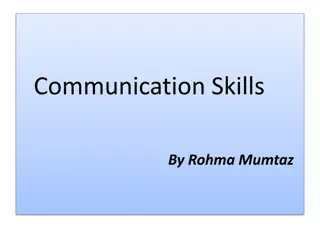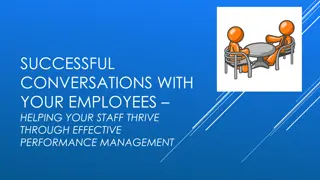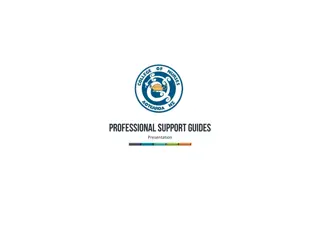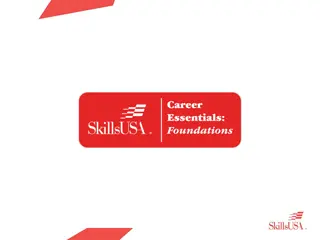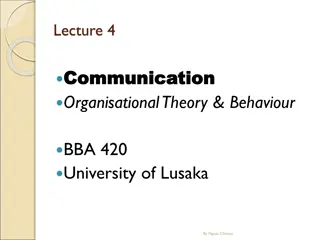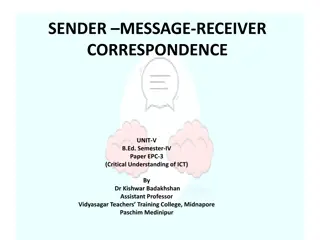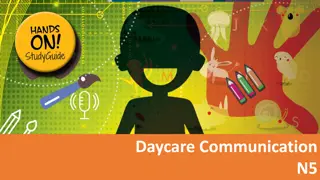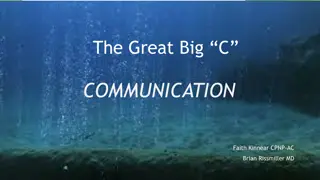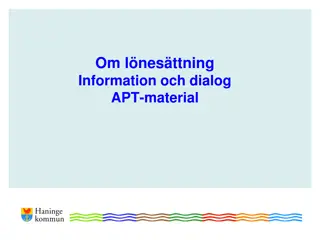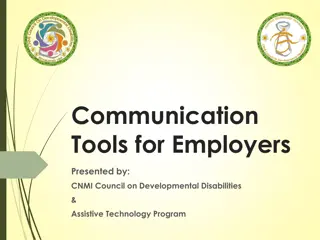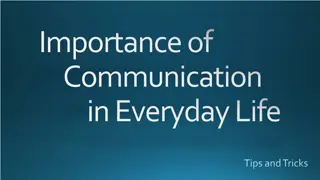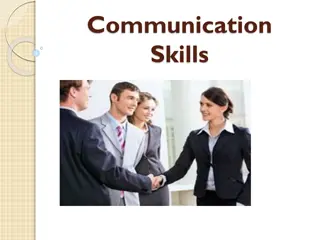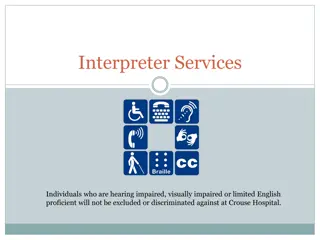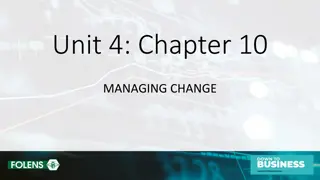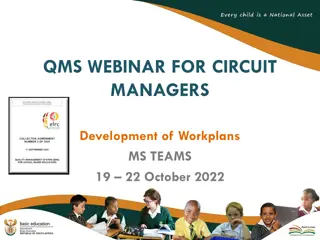Effective Communication Strategies for Managers
Enhance your communication skills as a manager with insights on industry-specific success, confidence building, likeable traits, signs of confident communicators, communication impact breakdown, understanding others, basic needs of people, and the importance of the Golden and Platinum rules in communication.
Download Presentation

Please find below an Image/Link to download the presentation.
The content on the website is provided AS IS for your information and personal use only. It may not be sold, licensed, or shared on other websites without obtaining consent from the author. Download presentation by click this link. If you encounter any issues during the download, it is possible that the publisher has removed the file from their server.
E N D
Presentation Transcript
Communication Strategies For Managers Presenter -- Martha N. Bryan Bryan & Bryan Associates 425-337-1838 Office *** 425-330-8418 Cell marthabryan@bryanandbryanassoc.com
Communication Industry Specific Success . . . Technical Skills 15% Communication Skills 85%
Confidence, Composure & Credibility People Who Have It People Who Don t Have It
Likeable People Smiles easily and often. Good sense of humor, fun, and can laugh at themselves. Are themselves authentic. Compliment easily and often. Understands common sense etiquette and how to use it. Are self confident. Engages you in conversation about yourself quickly. Knows their limitations and that they do not have all the answers. Are approachable and touchable.
Confident Communicators . . . Here Are The Signs Credible Easy to persuade when you are trusted. Intelligent -- People relate to intelligent speakers more quickly. Strategic Thinker - Understands audience and can adapt quickly. Passion -- Is an asset to persuasion. Information Sensitive to issues, challenges. Facts Has prepared, information well documented. Control -- Calmness is inviting. Connection -- Can find common ground with audience. Understanding Knows what turns an audience on and off.
Communication Impact Voice 38% Non- Verbals 55% Words 7% . . . when connecting with others.
Facts to Understanding Others We are all egotists. We are all self-centered. We all want to succeed. We all crave appreciation of others.
Basic Needs of All People The Three A s Approval Acceptance Appreciation
Communicating Their Way! Golden Rule Platinum Rule Treat others the way you would like to be treated. Treat others the way they would like to be treated. (Assumes Similarities) (Accepts Differences) We have committed the golden rule to memory. Now let us commit it to practice.
Body Language Words Voice Tone Posture Face Gestures Moving Forward Pace Space Versus Pitch Touch Holding Back Volume Dress Attitude
To Communicate Successfully . . . It Helps To Understand What Interests People. Themselves Their Opinion Others Things You
Success With Others The Feel . . . ___________________ ___________________ Listening ___________________ ___________________ * * * * * * * * * * * * * When It Is Done Right & When It Is Not ___________________ ___________________ ___________________
Communication Effectiveness 100 % At Most . . . 50% 75 % 50 % - Misunderstood (half) of everything said 25 % - Effective as Listeners 0 %
Communication Guidelines . . . The Basics (slide 1 of 2) Build self - esteem Build breadth and depth of knowledge. Live a pattern of cooperation. Build an "emotional bank account" with others. Understand interaction styles -- adjust your style as needed. Use the platinum rule. Mirror! Mirror! Mirror! -- reflect what you see and hear. Listen! Listen! Listen! Practice the skill of artful vagueness. Protect the other person's ego by looking for the good. Seek first to understand others point of view before trying to persuade others. Stop value judging others. Understand the other person's motivation.
Communication Guidelines . . . TheBasics(slide 2 of 2) Understand that what is right to the other person is right as he / she sees the situation. Develop an appreciation that no one s full meaning can be understood by word alone. Think before you speak. Question your listener to check for understanding. Resolve disagreements quickly. Say it once. When you are wrong, admit it. Let the other person save face. Argue the other side first. Clear up misunderstandings before they become serious problems. Watch your attitude! Read your audience. Weigh carefully how you are impressing your audience.
Active Listening Guidelines (slide 1 of 2) 1. Prepare yourself to listen. 2. Create a positive listening environment. 3. Fight off distractions. 4. Be sensitive to your "hot spots. 5. Maintain eye contact. 6. Use body language to reinforce listener. 7. Remain open and neutral. 8. Don't interrupt -- hear the complete story. 9. Don't trust important facts to memory. 10. Listen selectively.
Active Listening Guidelines (slide 2 of 2) 11. Pause before responding. 12. Ask questions. 13. Eliminate value judging. 14. Recognize emotions. 15. Empathize with the speaker. 16. Restate main point. 17. Use speaker's words to get own point across. 18. Stick to speaker's subject. 19. Ask speaker, "what is your suggestion? 20. Get agreement. Nothing is quite so annoying as to have someone go right on talking when you re interrupting.
Interacting With Superiors Be prepared. Summarize the data. Keep your appeals brief. Offer help without being asked for it. Stick to the facts -- no weasel language. Don t tell tales about your boss out of school. Listen to what the boss talks about. Don t take everything personally. Don t pass the buck - when in doubt, assume personal responsibility. In tough times, take the blame and move on. Don t make the boss nervous. Summarize, take notes, and send the boss a copy. When the conversation ends, make sure the boss feels s/he is still in charge.
Interacting With Peers Ask peers for their opinion What do you think? Rephrase and restate what they said. Recognize the good in them and their work. Be sensitive to their workload. Seek first to understand before attempting to be understood. Don t tell tales out of school, and don t spread rumors about them. Don t order people around. Don t cut them off. When referring to their work, stay away from holding back words. Tactfully sidestep conflict by looking for the positive objectives that motivate your colleague. Deal with a brewing feud quickly - nip it in the bud. Before giving them a piece of your mind, take a break.
Interacting With Employees Use the person s first name repeatedly during an exchange. Let the employee deliver the message that is on their mind Let them blow off steam - let them get it out. Offer sympathy for their situation. Ignore aggressively challenging questions - stick to the task. Don t forget to praise. Give validation when appropriate. Recognize when an employee is fishing for a compliment. When possible bring the employee in on decisions affecting them. Look for the valid point before responding to obstacles the employee brings to you. Ask for their advice. Treat employees as if they are superstars - be impressed.
Dialogues That Make a Difference Do your homework. Get the timing and setting correct. Be authentic. Express your thoughts clearly. Be willing to express your feelings (tempered with reason). Be present -- no preoccupation. Don't fake listening -- take notes, lean in, paraphrase, ask questions. See the world through the employee s eyes. When presented with an opposing view, avoid becoming defensive or hostile (example: no yes but, however). Postpone evaluation until you fully understand what the employee is saying. Be willing to change your mind and position when new truths are uncovered. Make the connection between organization as well as employee's goals.
Effective Organizational Communication Let employees know where the organization is headed. The destination The road map for getting to the destination Their role in following the road map to the destination Let employees know clearly what is expected of them. Clearly spell out what you are willing to do to help. Give employees accurate and timely feedback on their performance. Inform employees about the progress of the organization. Provide accurate and complete information. Let employees know about major issues influencing the organization. Actively seek Ideas, opinions, and suggestions from employees. Interact with employees one-on-one to discuss their concerns and goals. Find ways to bump shoulders with them. Talk the talk and walk the talk.
Building Emotional Intelligence For Greater People Success
Emotional Intelligence Those Who Have It! __________________________ Those Who Don t! __________________________ __________________________ __________________________ __________________________ __________________________ __________________________ __________________________ __________________________ __________________________ __________________________ __________________________
Emotional Intelligence . . . is the ability to recognize and manage one s own emotions to motivate oneself and restrain impulses. Emotional Maturity . . . is the ability to use your emotions in a positive and constructive way in relationships with others.
Are Self-Motivated Even during very frustrating circumstances, they can stay motivated. Can Control Their Impulses & Delay Gratification They see the big picture and don t have to have everything immediately. People Regulates Their Own Moods They recognize emotions and use self-talk to keep emotions under control. With High Handles Stress Well They don t allow stress to overwhelm them and cloud their thinking. Emotional Empathizes With Others They recognize emotions in others and give emotional support to them. Intelligence Handles Anger Well Instead of flying off the handle, they think, then speak. They show control and wisdom, considering the other person s point of view before reacting. Listens Carefully They listen to the words, sense the emotions and watch the speaker s body language. They make the person feel that they are understood.
Emotional Intelligence Motivation * * * * * * * * * * Optimism Emotional Control Self Awareness Relationship Management -- Flexibility Social Awareness -- Skills
Why Is Emotional Intelligence Important? Helps you relate well and cooperate with others in the workplace (understanding other people's emotions and motives) Maintain satisfying personal relationships (by managing and balancing your emotions) Respond to others with empathy and compassion Allows you to use your emotions in a creative, productive way (in touch with your emotions) Resolve conflict more easily Helps you achieve your goals (cooperation with others, emotion management, maturity) The Feelings Of Life . . . Do Not Reflect The Facts Of Life
Emotional High Jacking . . . Is when a person is so overwhelmed by their feelings that they act without concern for their own or others safety. The Challenge angry with the right person, to the right degree, at the right time, for the right purpose, and in the right way this is not easy. Anyone can become angry that is easy. But to be ~ Aristotle
Emotional High Jacking What causes you to lose emotional control? When you feel . . . someone has violated your values. that you have no choices or options. When you are . . . in physical or emotional danger. treated unfairly. disappointed with yourself. When something or someone gets in the way of what you want to do.
Moving to High Emotional Intelligence intelligence is the time taken to calm down in a stressful situation. The most important fact that differentiates a person with high emotional For adequately handling stressful situations, recognize . . . When you are stressed How you react to stress Which techniques works best for you Emotional Control Can Be Difficult! It is difficult to wrestle with internal demons -- to experience strife at the core of your being -- and at the same time behave graciously towards others.
Emotional Intelligence Skills Self-Awareness Social Skills Optimism (Motivation) Having a positive / optimistic outlook on life Emotional Control Dealing with change / conflict calmly Flexibility Skills Using problem solving to develop options Understanding how you feel & how that affects others Listening intently & adapting your communications Emotional Intelligence Involves The Ability To . . . Accurately Perceive Emotions In Oneself And Others, Use Emotions To Facilitate Thinking, Understand Emotional Meanings, And, Manage Emotions.
Developing Your Emotional Intelligence Work with a mentor or personal coach to improve your emotional intelligence. Use assessment tools to understand your strengths and vulnerabilities. Understand your emotional style. What do you do to avoid discomfort? Identify the causes of feelings, thoughts, distortions, and split-second responses. Differentiate between emotion and the need to take action. Acquire the skills of learned optimism, and use your optimism when appropriate. Find better ways to explain events. Learn to reframe negatives. Increase your listening skills for reading the non-verbals. Turn emotional mistakes into energy . . . make plans for a better next time. Increase your feedback to yourself and to others. Increase your appreciation of yourself and others.
Emotional Intelligence . . . Is the ability to know another s feelings and to act in a way that further shapes those feelings in a positive way. * * * * * * * * * * * * * * * * * * * * * * * Emotional maturity is the ability to handle relationships.
Want Caring Communication Success? Confident Considerate Committed Creative Just Be . . . . . . . . . . . . . . . Controlled Contagious Consistent Professional Positive Productive
"I am going to be meeting people today who talk too much - people who are selfish, egotistical, ungrateful, but I won t be surprised or disturbed, for I can't imagine a world without such people. ~ Marcus Aurelius The End Martha N. Bryan, Presenter * * * * * * * * Thank you 425-337-1838 Office * * * 425-330-8418 Cell marthabryan@bryanandbryanassoc.com
